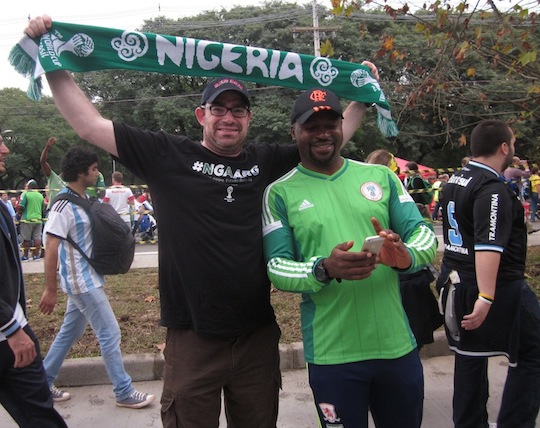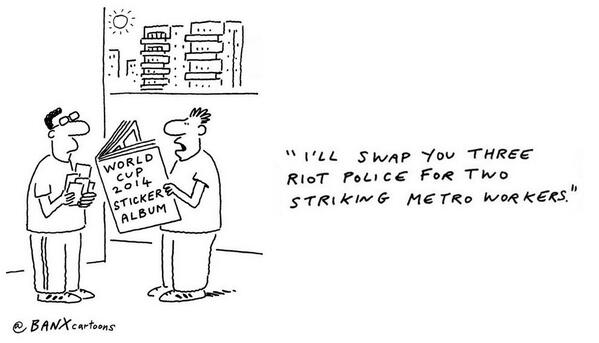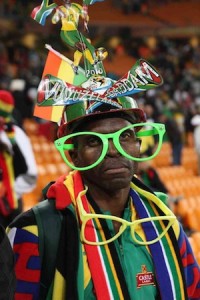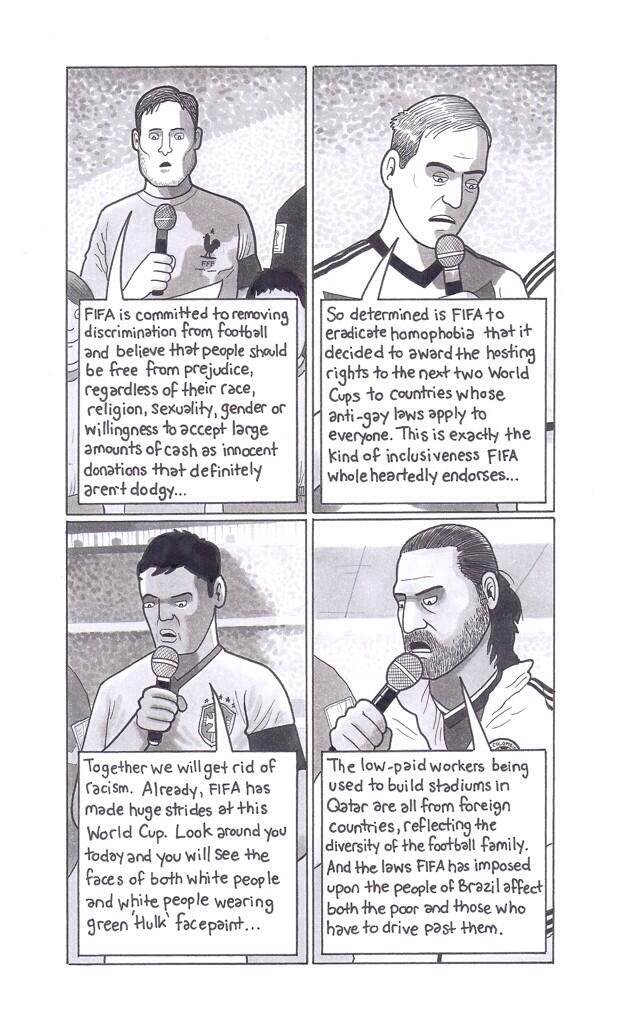Radio talk show host, author, and political analyst Eusebius Mckaiser spoke with Robin Petersen, CEO of the South African Football Association’s development agency, about what is going wrong and what needs to be done about the future of Bafana Bafana—the South African men’s national team.
Peterson has an unusual background for a South African football administrator. He owns a construction company and holds a PhD in Religion and Ethics from the University of Chicago Divinity School. Since 2001, Peterson has held important positions, including as CEO of SAFA and the domestic Premier Soccer League. In his new role at the helm of SAFA’s Development Agency, Peterson’s job is to ensure that the football development plan known as SAFA Vision 2022 is implemented.
In conversation with Eusebius and his listeners, Petersen touches in general terms on a 7-point plan that includes a national football philosophy; youth teams and academies; coach education; football infrastructure; and sports science. The complete absence of a sense of history in his remarks underscores a serious problem within South African football: an unwillingness to deal honestly and productively with what has already been said, tried, and failed in the two decades since the end of apartheid and the birth of democracy. (For two different, but complementary, critiques of South African football development, click here and here).
Despite Petersen’s best intentions and SAFA’s more sophisticated packaging, it seems that, once again, the latest development plan amounts to little more than a public relations campaign.
Category: Hosting

Guest Post by *Derek Charles Catsam
I recently returned from the 2014 World Cup in Brazil. It was a remarkable experience in a beautiful country. Everywhere we went people were gracious, joyful hosts. We ate fantastic churrasqueira (the Brazilian barbecue that will fuel my dreams for months) and drank among friends. The games were tremendous, the colorful visiting fans (with special mention to the dancing, chanting, singing, drinking Argentine throngs) made the World Cup the event that it is. The protests were more intermittent than expected. But the issues raised were as valid as ever.
I was based in Porto Alegre in the state of Rio Grande do Sul on Brazil’s southern border with Uruguay and Argentina. I attended four matches in Estadio Beria-Rio, the home of Sports Club Internacional: France-Honduras, Algeria-South Korea, Argentina-Nigeria, and the round of 16 match pitting eventual champions Germany against the Algeria. With 32 teams competing, the first two weeks of the World Cup are an unparalleled Carnival of Nations. Porto Alegre was in the midst of a Brazilian winter, hardly freezing, but occasionally raw and damp. The bikinis and swimming shorts that many of you saw as the regular going-to-commercial interludes on ESPN were many hundreds of miles north.
The tournament, which equaled the most goals (171) ever scored in a World Cup, was spectacularly entertaining and Germany is certainly a worthy champion. But once the confetti cleared, the last drinks were downed, tourists returned home, and Brazilians shook off the shameful way the Seleção flamed out of the tournament (and I do not for one second believe that the presence of Thiago Silva and Neymar against Germany and the Netherlands would have made much difference—Brazil’s problems were systemic) a familiar question looms: Was hosting the World Cup worth it?
Brazil 2014: World Cup Politics
The day before the magic kingdom opens in São Paulo, WKAR’s “Current State” host Mark Bashore interviewed me about the politics of the World Cup. We discussed FIFA profits and institutional reform, special World Cup laws and extraterritoriality, nation-building, development, civic protests, and what the future holds for Brazil, on and off the pitch. Originally broadcast live on June 11, 2014. Take a listen!

I was recently interviewed by BBC Brasil‘s João Fellet and asked to compare the hosting of the 2010 World Cup in South Africa with the preparations for the 2014 World Cup in Brazil. Below is the Portuguese text of what transpired [translate] and a link to read the full article.
15 May 2014
BBC Brasil – Quatro anos depois da Copa de 2010, o que ficou do torneio para os sul-africanos?
Peter Alegi – Há um tipo de nostalgia por aquele período, por aquela sensação de unidade, solidariedade, de estar no centro do mundo. Os estrangeiros que foram para a Copa perceberam que os estereótipos negativos sobre a África do Sul não eram verdadeiros, e isso ainda faz o país se sentir bem. As emoções de um carnaval como a Copa são difíceis de bater.
BBC Brasil – Houve outros legados?
Alegi – O legado emocional foi importante de diferentes maneiras. Ele fez as pessoas sentirem um senso de unidade num país ainda muito dividido quanto a raças, classes e gêneros. Nos estádios sul-africanos, as pessoas cantam o hino abraçadas ou de mãos dadas, como nas igrejas. Num país onde o povo não tem muitas oportunidades de estar junto, a mágica do nacionalismo explodiu de uma maneira positiva.
Isso aconteceu só 16 anos após o apartheid. Sediar um evento bem sucedido fez com que os sul-africanos se sentissem muito orgulhosos.
O torneio também despertou sentimentos de panafricanismo. Por um ou dois meses, os sul-africanos se sentiram parte do continente africano. Isso foi encorajador, levando em conta os problemas do país com a xenofobia.

To read full article click here.
Recently, I spoke with Liz Timbs, the creator of Imbiza 1.0: A Digital Repository of the 2010 World Cup in South Africa. Imbiza (http://imbiza.matrix.msu.edu) is an open-access web-based project that uses a highly modified theme on a WordPress framework. Objects contained in Imbiza were catalogued and preserved using KORA, the digital repository and publishing platform developed by Matrix at MSU. Liz is a Cultural Heritage Informatics Fellow and a PhD candidate in African history at Michigan State University. She is a regular contributor to Football Is Coming Home. Follow her on Twitter at @tizlimbs.
 Why do we need a Digital Repository on the 2010 World Cup?
Why do we need a Digital Repository on the 2010 World Cup?
I began to develop this idea after an October 2013 session of the Football Scholars Forum on the edited volume, Africa’s World Cup: Critical Reflections on Play, Patriotism, Spectatorship, and Space. During the online discussion, the conversation turned to ways of integrating academically-oriented essays like those in Africa’s World Cup with web-based images, videos, and texts produced by non-specialists for a general audience. While this conversation was framed in terms of what could be done for the upcoming World Cup in Brazil, I began to wonder how a project like the one being bandied about by these journalists and scholars could be used to help us further understand the 2010 World Cup in South Africa. That’s really where the idea for Imbiza came from.
This repository serves several complementary purposes. First, it provides an opportunity to think about the 2010 tournament in advance of the upcoming World Cup, challenging us to think about how the content created for Brazil 2014 will be preserved as well as the types of content that specialists should be consciously working to either create or capture. Second, I believe that combining African Studies, sport history, and digital humanities—often perceived as “niche” disciplines—challenges conventional conceptions about knowledge production and what kind of scholarship counts. Finally, many of the images and videos in this digital archive illustrate a very important part of the 2010 tournament: the hope it generated among international fans that their teams would go far in the competition and among South Africans that the World Cup would change the image of their nation around the world.
What was your initial vision for the project and why did it change from inception to v. 1.0?
My initial vision for the project was to build a comprehensive digital archive of the World Cup, combining textual, audiovisual, and digital sources. As I started the collection process, I really underestimated the amount of material that I would find. In addition to the submissions I received from my contributors, the textual sources that I uncovered were a bit overwhelming and I had to recalibrate my expectations. With this in mind, I decided to limit my focus to just the stadiums and fan parks. An added benefit of this approach was that it provided a way to use these physical sites as prisms through which to analyze some broader themes around the tournament.
Even with some constraints, however, arranging everything I had into a coherent project was still a daunting task. As I re-evaluated what I collected, I decided for version 1.0 to present only photos and videos that contributors shared with me. In other words, I left out much of the publicly available multimedia record on the web. The audiovisual materials produced by my contributors are so emotive and rich that I knew using these sources would result in a dynamic presentation that would set a high standard for the next phase.
Tell us about the process. How did you set out to collect the audio-visual materials and what was that experience like?
The process, like the project itself, really originated in the Football Scholars Forum. My first step after conceptualizing Imbiza was to reach out on Twitter, asking friends and colleagues (and friends of friends and colleagues) to either contribute their own content or alert others who might have relevant materials to the project. The majority of the project’s content was collected this way, integrating content from Peter Alegi (@futbolprof), Chris Bolsmann (@chrisbolsmann), Marc Fletcher (@marcfletcher1), Duane Jethro (@materialpasts), Kevin Kalinowski, David Patrick Lane (@LosCharruas), Jay Meyer, and Mark Moll. Later, I also made a call for material on various academic listservs and even to some friends on Facebook. That’s why I refer to this project as “digital, from top to bottom.” This collaborative process has been really inspiring and productive for me and I look forward to continue to foster relationships like this for Imbiza and other future projects.
After I received these materials, I began to catalog all of them through KORA. This was probably the most time-consuming task; making entries for each individual object, arranging them by category, and beginning to conceptualize how they could all be grouped together as the site progressed. From there, I started to make mock-ups of the final website (which probably changed five times before I got to the current design). Then, I began programming the site itself, modifying the WordPress theme, and rolling with the (numerous) technical difficulties, eventually getting to what you see on the site today. There’s still a lot of work to be done, but it’s already come a long way!
Tell us about some of your favorite digital World Cup sources. What was most eye-opening about them?
I have two favorite sets of sources from this version of the project. I was probably the most excited about Chris Bolsmann’s photos because a lot of them haven’t been made publicly available before (except a few that were published in Africa’s World Cup). They really capture the different nations’ fan cultures, the atmosphere in the stadiums, and some of the art exhibitions that happened around the tournament, like the Halakasha! exhibit in Johannesburg. Chris’s photos are also quite artistic in their own right. The photo of a fan after Ghana’s loss to Uruguay (see above) is so compelling, juxtaposing the joy of his makarapa, giant glasses, and jersey with the utterly disappointed look on his face.
On the other side of things, I’ve really loved delving into David Patrick Lane’s videos. His interviews with locals, his Gizza series with fans from different countries, and his footage of various Uruguay matches opened my eyes to the tournament in new ways. His interview with Amos, a sanitation worker in Johannesburg, is probably my favorite video in the entire collection. It always makes me smile and, I think, says a lot about the Pan-Africanist sentiment at the tournament. (Shame that Davy’s laptop was stolen towards the end of the tournament. It would have been great to see him do some post-tournament interviews and capture some of the frenzy of Ghana v. Uruguay.)
You called this project “Imbiza 1.0.” What can we expect in version 2.0?
Version 2.0 will include more photos and videos from the 2010 World Cup, as well as a lot of textual sources that I gathered in the collection process. I have a PDF of the entire 2010 Bid Book that I hope to break into smaller segments for easier consumption, as well as a huge number of newspaper articles that I found online. Duane Jethro has provided me with some very exciting and original sources on vuvuzelas that will add a really interesting layer to the next version.
You can also expect the integration of some sources on the upcoming World Cup in Brazil as well as some comparative analysis. I am working to set up a Twitter archive to collect tweets for the 2014 World Cup and I am also beginning to reach out to Brazil experts for sources and ideas. I hope to set up a second World Cup archive for Brazil, tentatively titled Legado; but this second project will depend on the progress I am able to make on Imbiza in the coming months.
Guest Post by Hikabwa Chipande (@HikabwaChipande)
 LUSAKA—Zambia is mourning football radio commentator Dennis Liwewe, who died on April 22, 2014, at the age of 78.
LUSAKA—Zambia is mourning football radio commentator Dennis Liwewe, who died on April 22, 2014, at the age of 78.
Liwewe caught the soccer fever on the Copperbelt in the late 1950s and 1960s, an era that led to the emergence of great players such as Samuel “Zoom” Ndlovu, John “Ginger” Pensulo and Kenny Banda. He became the first black football commentator in the early 1960s before Zambia’s independence. Liwewe’s passionate radio broadcasts made him a household name among ordinary Zambians. At a time when there was no television, Liwewe’s enthusiastic and absorbing descriptions of matches helped popularize the game across the country.
By the mid 1970s, he was known as a prominent football announcer in neighboring countries such as Tanzania, Malawi, Zimbabwe and Botswana. When Zambia reached the final of the 1974 African Cup of Nations finals in Cairo (which Chipolopolo lost to Zaire [now DR Congo]), the Egyptian weekly magazine Al-Musawar labeled Dennis Liwewe the greatest football commentator south of the Sahara. He drew favorable comparisons with the famous Egyptian radio and television broadcaster Mohamed Latif. (Latif had played for Egypt’s national team in the 1930s, then became a referee in the 1940s, before going on to earn the nickname “Sheikh of Commentators” in the 1950s.)
From the 1960s to the early 1990s, football on the radio was synonymous with Dennis Liwewe. His emotionally loaded calls made listeners of all ages in towns and villages around the country visualize what was happening in a stadium far away. He could estimate and explain all free-kick angles, distances to the goal, and the speed of the ball in a vivid and unmistakable voice. He had that distinctive ability to carry listeners with him, bringing enjoyment to their lives and even making them proud to be modern Zambians. It was not uncommon to hear both young and old people reciting and imitating his soccer commentaries, a kind of oral literature. No wonder Zambians felt that broadcasters who did not announce like Liwewe were just not good enough.
Even after the introduction of the Mwembeshi satellites and television broadcasts in 1974, Liwewe’s radio work remained popular. It was common for soccer fans to watch live matches on television with the volume turned down to listen to Liwewe on the radio. Many fans also went to Independence Stadium in Lusaka carrying two-band radios so they would not miss Liwewe’s entertaining narration. My good friend Mtoniswa Banda reminded me that another reason why fans carried radios to the stadium was because Liwewe often exaggerated or made up his play-by-play commentary. Even when the action was dull and distant, he could narrate it as if it were only a few inches from the goalposts! Other Zambian supporters also note that Liwewe became too commercial in his old age, to the point that he demanded to be paid in cash for an interview about the history of the game.
Aside from his radio work, Liwewe was employed by the Mining Mirror as a sports reporter for the Nchanga Consolidated Mines in Chingola. Subsequently, he rose to the position of Director of Public Relations of the Zambia Consolidated Copper Mines (ZCCM) before retiring in 1985.
Dennis Liwewe’s name in Zambia evokes memories of young people in urban townships and rural villages assembling makeshift radios, repairing (or buying) new ones, putting their old batteries out in the sun hoping to get enough power to listen to their favorite football announcer. History will show that here in south-central Africa his voice, passion, and imagination were not only admired, but loved, like the beautiful game itself.
